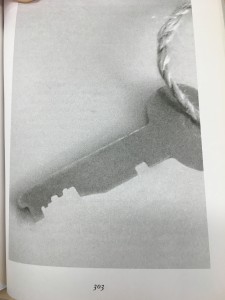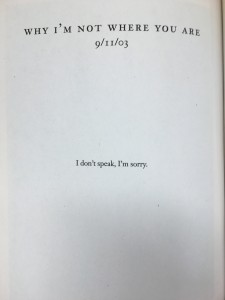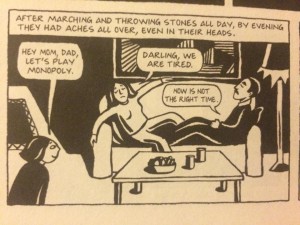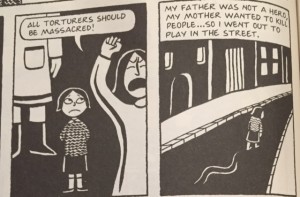Hello Readers!
It is a bittersweet return to university, leaving family behind (in Toronto for me), seeing your friends again and dealing with sad yet important material in class. We have begun our second term with a study of Extremely Loud & Incredibly Close by Jonathan Safran Foer. It tells the story of a young boy named Oskar Schell who discovers a key in his recently deceased father’s closet. He goes on a quest across the boroughs of New York searching for the lock the mysterious key will open. It is a heartbreaking story of loss, love and healing. Within the story, tragedies echo one another as Oskar’s grandparents narrate their trauma and loss following the Dresden fire bombings in WWII and Oskar narrates his life as he deals with his trauma following the death of his father in the 9/11 terrorist attacks. There were so many great blog posts and many diverse interpretations of Foer’s novel. If I could I would gladly explore all these themes and topics but I sadly do not have the time or space to do so in this class blog. Therefore I have chosen to focus on a couple student blogs that stood out to me, as well as focus on the grand theme of loss in this class blog post.

Image taken by me of p.303 of Foer’s novel. It depicts the key that Oskar found in his father’s closet. It is on a string and he carries it around his neck for most of the novel.
A blog post that really caught my attention was Joseph’s. He related the storyline of the novel to the Beatle song references within the novel. It was completely different than any of the other blogs I had read and dealt with a concept not previously addressed. He examined specific Beatle’s songs (and lyrics) mentioned in the novel as they “frame[d] the stages of the narrators’ development over the course of the book.” It was an analyses that really surprised me at first, but upon closer reading was well thought out, well presented and clever. At the end, he tied grandmother’s, grandfather’s, Oskar’s mom and Oskar’s grief and pain together with the modified lyrics “Remember to let [Mom, Grandma, Grandpa] into your heart, then you can start to make it better” from “Hey Jude.” It perfectly captures Oskar’s need and his grandparents need to let others into their life who have also known great loss. Oskar fiercely sees his loss as “mine” (Foer, 256) and therefore has trouble letting others in, especially his mother. His grandparents cannot seem to cope with the tragedies that have occurred in their lifetimes. They cannot let each other in and, as Mia talks about in her blog, they create “Nothing” and “Something” spaces to enable them to live together (Foer, 110).
While Joseph’s blog examined song lyrics, a large number of bloggers (including Ryan, Isaiah, Olivea, Paolina, Jackson, Alex, Kate, Elizabeth, Martin, Erin, Grace, Mia) discussed various aspects of the themes of loss, trauma, absence and coping with loss. Another blog post that stood out to me was Isaiah’s because of the eloquent way he expressed these themes. He focused on the coping mechanisms of Thomas Sr. (Oskar’s grandfather) and Oskar. Discussing grandfather’s loss of speech and Oskar’s desperate search for “some sort of closure.”

Image taken by me of p.262 from Foer’s novel. It is a visual representation of how Thomas Sr. uses daybooks to communicate when he loses his ability to speak. His use of “I’m sorry” (since it is repeated several times in the novel) demonstrates his pain and sorrow towards all those he lost. To me it seems as if he is sorry for having lost those he did and he is sorry for the life he has lived.
Other bloggers, such as Mia and Joseph also touched upon the various coping mechanisms of the characters, such as grandfather’s lack of speech, grandmother’s apparently “crummy” eyes (Foer, 307) and Oskar’s search, as well as his anxiety. Isaiah discussed grandfather’s defeat when faced with grief and tragedy. He “became the shell of a man and removed himself from the world emotionally.” I had not associated his coping with defeat before but when I read this blog it truly resonated with me. His life is such a tragedy and he lacked the will to live after he suffered the great loss of Anna and his unborn child in the Dresden fire bombings. This analyses made me think about the contrast created in the novel between Thomas Sr. and Oskar’s coping mechanisms. While Thomas Sr. is defeated, Oskar, even with all his grief and pain, still somehow continues to live. His life has changed: he has “heavy boots” (Foer, 2), appears to suffer from PTSD and has many fears, yet he still searches for the lock. He is still curious about the world and is present in his life. Life is not as it used to be before “the worst day” (Foer, 11) but at least Oskar still tries to live a life.
Joseph’s analysis of the Beatles songs, Isaiah’s (along with other bloggers) presentation of coping mechanisms and the bloggers’ personal reactions (in their analyses and opinions in most blog posts this week) to Foer’s novel demonstrate to me the connection that forms between people who have suffered great loss in their lives.Tragedy brings people together and together people may be able to find healing and find life again. As terrible as tragedy is, it makes you appreciate life so much more. As Isaiah puts it, “[y]ou can’t truly appreciate something special until you’ve lost something special” and as Elizabeth puts it, “we should always let the ones close to us know just how much we care about them” because death can “take away a loved one in a blink of an eye.”
Thank you for reading!
Sincerely,
Clara
References (not hyper-linked in the text)
Extremely Loud and Incredibly Close by Jonathan Safran Foer


